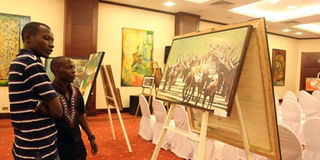Government should invest more in arts and culture sector

Art. Revellers admire a piece of art at Kamukamu Art Auction in Kampala in 2016. Artists say their contribution has either been undermined and undervalued by design or default. PHOTO BY MICHAEL KAKUMIRIZI
What you need to know:
- Undermined? Despite its role, Nuwa Wamala Nnyanzi argues that government is yet to appreciate and recognise the contribution of the culture and creative industries in national development.
In the past, musicians, painters, and sculptors enjoyed patronage of kings, popes, and the wealthy, especially the merchants.
It was the same here in Uganda during the kingdom era and soon after the 1966 Mengo crisis.
State patronage disappeared in the 1980s and subsequently, even that of the church and private sector shrunk significantly.
A return to State patronage is not only desirable but necessary to instil a sense of self-belief and actualisation among the people who, at present, seem to be struggling with identity crisis.
Uganda’s policies
As long as we continue to cut and paste policies from elsewhere without domesticating them, we will continue to wonder why we have so many unimplemented (I hasten to add implementable) nice sounding policies on the books!
What Uganda needs are policies that are informed/influenced by our cultural and traditional values to be impactful.
Creative people in Uganda are not disorganised as suggested by many commentators, including some artists, they are merely unorganised. Otherwise, how could they have been able to get where they are today without government help?
The problem, therefore, is lack of talented passionate professional managers to strategically mind and guide creatives.
Unlike other industries whose success depends on structured unity, the culture and creative industries’ success thrives on unity in diversity.
It is important to note that on their own, they have come from very far and are determined to go very far.
Producing a work of art takes a lot in terms of intellectual and physical energy.
By the time an artist is done with creating the art piece, he/she is completely drained.
Therefore, expecting the same artist to excel equally in managerial and marketing roles thereafter, is asking for too much.
Their contemporaries elsewhere, with whom people here are fond of comparing them, are managed and marketed/promoted by skilled and specialised handlers in those areas.
Uganda generally lacks managers. That is why we are in this quagmire. Most Ugandans who have excelled on the international stage are either Diasporas, assisted by Diasporas or foreigners domiciled here.
Not that the culture and creative industries haven’t contributed to national development, of course they have, but their contribution has either been undermined and undervalued by design or default.
Examples of their contribution include creating symbols of identity, mobilisation for unity and development, advocacy for noble and not so noble causes, inform, educate and entertain society.
The creatives are deployable in all sectors of development, and have been doing so, albeit under the radar.
Contribution to GDP
Every weekend, the Uganda Revenue Authority (URA) collects taxes from creatives’ performances. Every weekend, creatives are busy ensuring the success of ceremonies, by dressing people, decorating venues, entertaining guests and managing ceremonies. Visual, performing and literary artists have impacted lives domestically, regionally and internationally.
Comedian Anne Kansiime is increasingly replacing [former president] Idi Amin when describing Uganda abroad. Jak Katarikawe’s [RIP] art is among the most collected from East Africa and Kyadondo East MP Robert Kyagulanyi, alias Bobi Wine, and Edirisa Musuuza, alia Eddie Kenzo, need no introduction on the global music stage.
While all this is going on, Uganda Bureau of Statistics (UBOS) is not shy to plead ignorance of the contribution of the culture and creative industries to national development.
I, therefore, would advise UBOS to work with universities to introduce a course in cultural economy and talent management.
The National Arts and Cultural Crafts Association of Uganda (NACCAU), has since 2003 paid more than Shs1b to the Uganda National Cultural Centre (UNCC), also known as the National Theatre, in ground rent. Mind you it isn’t rent because we put up our own structures.
Despite this, government is yet to appreciate and recognise the contribution of the culture and creative industries in national development. That is why there are no official statistics to that effect.
Had government shown interest in the development of the sector, the private sector would have characteristically moved to invest in the sector because they tend to gravitate towards where there is quick and assured returns or where government has shown interest.
Way forward
Moving forward, government should be the primary consumer of our products and also use incentives to attract the private sector to invest heavily in the sector.
It is the only sector that has registered growth without government direct support. You can imagine how far it will go with given a push.
As we prepare to deal with post Covid-19 psychological, social and economic challenges, government should consider extending a stimulus package, and tax amnesty to artists.
As for NACCAU, rent deferment for at least six months would suffice, after all UNCC, our landlord, is a government parastatal body under the Ministry of Gender, Labour and Social Development.
Free Internet access too would go a long way in encouraging and empowering creatives to embrace digital tools in their businesses.
Government should also embark on training and grooming talent managers, a skill that is lacking yet talent abounds.
The writer is the vice chairperson of NACCAU, and a visual arts practitioner/consultant, Nnyanzi Art Studio.




